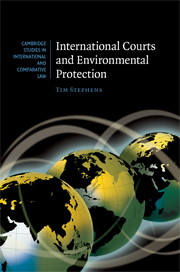Book contents
- Frontmatter
- Contents
- Foreword
- Acknowledgements
- List of tables
- List of figures
- List of abbreviations
- Table of cases
- Table of treaties and other international instruments
- CAMBRIDGE STUDIES IN INTERNATIONAL AND COMPARATIVE LAW
- 1 Introduction
- Part I International courts and environmental governance
- Part II Judicial development
- Part III Contemporary challenges
- 8 Public interest proceedings
- 9 Jurisdictional coordination
- 10 Fragmentation of international environmental law
- 11 The future of international environmental litigation
- Bibliography
- Index
9 - Jurisdictional coordination
from Part III - Contemporary challenges
Published online by Cambridge University Press: 21 August 2009
- Frontmatter
- Contents
- Foreword
- Acknowledgements
- List of tables
- List of figures
- List of abbreviations
- Table of cases
- Table of treaties and other international instruments
- CAMBRIDGE STUDIES IN INTERNATIONAL AND COMPARATIVE LAW
- 1 Introduction
- Part I International courts and environmental governance
- Part II Judicial development
- Part III Contemporary challenges
- 8 Public interest proceedings
- 9 Jurisdictional coordination
- 10 Fragmentation of international environmental law
- 11 The future of international environmental litigation
- Bibliography
- Index
Summary
The heterogeneous collection of adjudicative procedures currently engaged in resolving environmental disputes has been described in this book as a jurisdictional patchwork because of the absence of any systematic organisation. The patchwork is characterised by substantial gaps, as proponents of an international court for the environment have been quick to point out. However, there are also overlaps, and these give rise to several practical challenges of jurisdictional competition and coordination including forum shopping, simultaneous litigation in multiple fora, and successive proceedings. This chapter examines the ways in which such practical difficulties can compromise the effective operation of international courts and tribunals in the environmental field. It is seen that these ostensibly procedural or technical problems have confounded clear resolution, and have produced substantive effects by preventing environmental cases from being resolved promptly and effectively. The first section identifies the types of jurisdictional competition that can arise between dispute settlement mechanisms operating in international environmental law. By reference to several recent disputes, the second section considers the ways in which such overlaps or conflicts may lead to practical difficulties. The third section assesses the efficacy of existing jurisdiction-regulating norms, and considers prospects for overcoming the growing problem of fragmentation in the governance of international environmental disputes.
Gaps and overlaps
Jurisdictional competition
The growing collection of bilateral agreements and multilateral environmental agreements have largely been developed in isolation from one another.
- Type
- Chapter
- Information
- International Courts and Environmental Protection , pp. 271 - 303Publisher: Cambridge University PressPrint publication year: 2009



